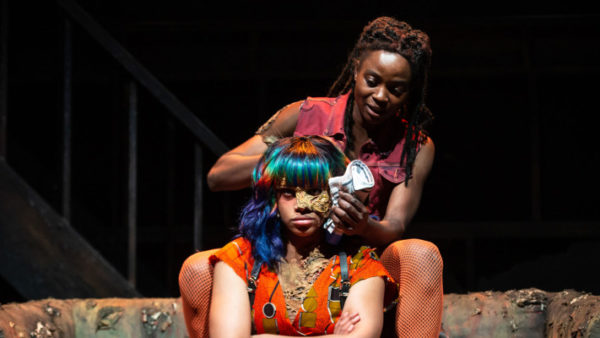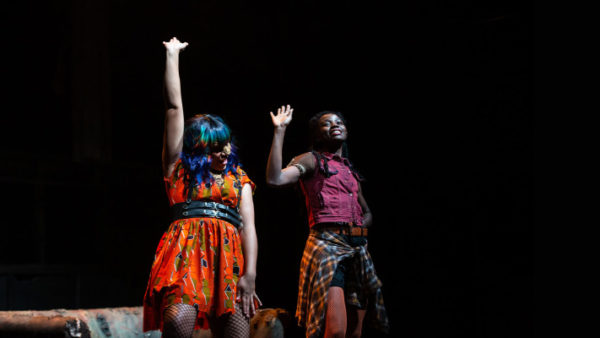Thursday 9 February
National Arts Centre Ottawa

Review by Ruth Aman
On the evening of February 9th, hundreds sat in a darkened theatre, eagerly waiting for the curtains to be pulled back. Parents sat with their children and others with their significant others while groups of friends filled the seats. All had come to the opening premiere of the play, ‘Is God Is’, an American comedy thriller written by Alesha Harris at Ottawa’s National Arts Centre.

In a play plagued by violence, love, and action, the audience was treated to a twisted journey following the lives of two sisters out for revenge. As part of the NAC’S Black History Month, this play was planned to run from February 9 – 18 2023 after a successful launch in Toronto in 2022. As a play with one of the first of two Black Out nights at the NAC, this running brought much controversy. A Black Out Night is known as a night dedicated specifically to Black theatregoers. Though many felt that it excluded others and exasperated the differences between Black theatregoers and those of different races, the Black Out night plan proceeded
Is God Is follows the story of a pair of twin sisters, Racine and Anaia, who are dragged into the craziest journey of a lifetime. The play opens up with the sisters detailing the story of their lives. Orphaned at a young age, they had been the victims of a terrible house fire that killed both their mom and dad. One day they receive a letter from their mother saying that she would like to see them before she dies. It turns out that she had been alive all the years, yet had not reached out to see them because she was badly burned by the fire. She feared that the scars would scare them away. However, now, as she is on her deathbed, she makes a request of the children: to find their father and kill him. It is then revealed that he is the one who had set her on fire and proceeded to set the house on fire. The girls are enraged by this truth and pledge to their mother that they will do everything and anything they can to avenge her. From this moment on the girls begin to call their mother ‘god’. The story then follows the girls as they travel to California, meet the father’s new family, and finally confront him with the truth. With a big showdown finale, the girls go to great lengths to avenge their mother, including the murdering of a few characters along the way.
This performance was directed by Mumbi Tindyebwa Otu. She currently is the Artistic Director of the Obsidian Theatre in Toronto, an organization known for servicing and uplifting Black Art in the nation. Featured in this play were actors from various acting capabilities and nations. Playing the main characters were Oyin Oladego, JD Leslie, Tyrone Benskin, and Alison Sealy Smith.

Older sister Racine was played by Owin Oladejo. Oladejo, with Nigerian heritage, has a career spanning international reach and is featured in CBS’ Star Trek: Discovery. Her character Racine is known for her short temper and eagerness to act upon any idea that seems logical. She is bold and determined to get everything done, no matter the cost. So when she received a letter from her mother in the hospital she jumped at the chance to go visit her. On the other hand, her sister was hesitant. Younger sister Anaia was played by JD Leslie, who has had great experience in film, theatre and television. As Anaia, Leslie acted as the more soft-spoken and reserved sister. Anaia needed a bit more convincing than her older sister when being persuaded to do certain things. In moments throughout the play, viewers are able to see her begin to break out of this shell and gain confidence in herself and her values.
The parents of the twins were played by Tyrone Benskin (He) and Alison Sealy Smith (She).
For the purposes of this play, these parents are not named and though they both are seen for a short amount of time, they both have a significant impact on the upbringing, motives, and actions of the two younger children.
This was a great play as it covered themes that many families may seem to deal with privately in their homes. Though it may not be done to the same extent, the issues of domestic violence, absent parenthood, and unhealthy coping mechanisms are something that can strike a chord with many in the audience. The actors did well in the expression of the characters as many in the audience could find themselves, a family member, or a friend in the behaviours of one of them. The characters were relatable not only in behaviour but in context as well. With many references to things in popular culture, it’s clear that this play was designed with the intention of being culturally relevant. This play had something for everyone and it was a great portrayal of Black art and creativity at its finest.
*****************************************************************

Ruth Aman is a Project Officer with Black History Ottawa. She holds a Bachelor of Global and International Studies (Honors) degree, with a specialization in Law and Social Justice from Carleton University.
